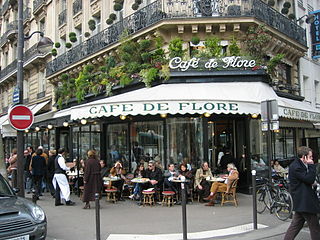
A coffeehouse, coffee shop, or café is an establishment that primarily serves various types of coffee, espresso, latte, and cappuccino. Some coffeehouses may serve cold drinks, such as iced coffee and iced tea, as well as other non-caffeinated beverages. A coffeehouse may also serve food, such as light snacks, sandwiches, muffins, fruit, or pastries. In continental Europe, some cafés also serve alcoholic beverages. Coffeehouses range from owner-operated small businesses to large multinational corporations. Some coffeehouse chains operate on a franchise business model, with numerous branches across various countries around the world.

Capitol Hill is a densely populated residential district in Seattle, Washington, United States. One of the city's most popular nightlife and entertainment districts, it is home to a historic gay village and vibrant counterculture community.

Tully's Coffee is an American specialty coffee manufacturing brand owned by Keurig Dr Pepper, which acquired Tully's brand and wholesale business in 2009.

The Seattle Center Monorail is an elevated straddle-beam monorail line in Seattle, Washington, United States. The 0.9-mile (1.4 km) monorail runs along 5th Avenue between Seattle Center and Westlake Center in Downtown Seattle, making no intermediate stops. The monorail is a major tourist attraction but also operates as a regular public transit service with trains every ten minutes running for up to 16 hours per day. It was constructed in eight months at a cost of $4.2 million for the 1962 Century 21 Exposition, a world's fair hosted at Seattle Center. The monorail underwent major renovations in 1988 after the southern terminal was moved from its location over Pine Street to inside the Westlake Center shopping mall.

Westlake Center is a four-story shopping center and 25-story office tower in downtown Seattle, Washington, United States. The southern terminus of the Seattle Center Monorail, it is located across Pine Street from Westlake Park, between 4th and 5th Avenues. It is named for Westlake Avenue, which now terminates north of the mall but once ran two blocks farther south to Pike Street. Westlake Park is considered Seattle's "town square" and celebrities and political figures often make appearances or give speeches from the building's balcony. The anchor stores are Saks Off 5th and Nordstrom Rack.

Westlake Park is a 0.1-acre (400 m2) public plaza in downtown Seattle, Washington, United States. It was designed by Robert Mitchell Hanna.

Espresso Vivace is a Seattle area coffee shop and roaster known for its coffee and roasting practices. Vivace's owner, David Schomer, is credited with developing and popularizing latte art in the United States.

Caffè Mediterraneum, often referred to as Caffè Med or simply the Med, was a café located on Telegraph Avenue in Berkeley, California, US, near the University of California, Berkeley. The Med was a landmark of Telegraph Avenue history, "listed for years in European guidebooks as 'the gathering place for 1960s radicals who created People's Park'" and as of 2009 described in Fodor's guidebook as "a relic of 1960s-era café culture". It was located at 2475 Telegraph Avenue, between Dwight Way and Haste Street.

A bikini barista is a woman who works as a barista, preparing and serving coffee beverages, while dressed in scanty attire such as a bikini, lingerie or a crop top combined with bikini bottoms or hotpants. In the United States, this marketing technique originated in the Seattle, Washington area in the early 2000s. Similar phenomena have appeared in countries such as Chile and Japan since at least the 1980s.
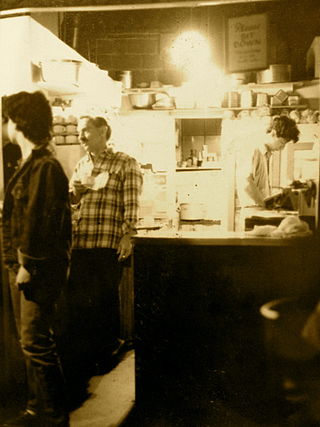
The Last Exit on Brooklyn was a Seattle University District coffeehouse established in 1967 by Irv Cisski. It is known for its part in the history of Seattle's counterculture, for its pioneering role in establishing Seattle's coffee culture, and as a former chess venue frequented by several master players.

Café Allegro is a coffeeshop in the University District of Seattle, Washington, United States. It is notable for being one of the city's first espresso shops and for its role in the history of Starbucks, as the place where founding proprietor Dave Olsen designed the Starbucks coffee product line. Situated in an alleyway, the cafe features multiple entrances and rooms.
Seattle is regarded as a world center for coffee roasting and coffee supply chain management. Related to this, many of the city's inhabitants are coffee enthusiasts; the city is known for its prominent coffee culture and numerous coffeehouses.

Crazy Mocha Coffee Company is a coffeehouse chain in the Pittsburgh, Pennsylvania region. As of August 2021, the chain has 10 locations.

Pike Street is an east-west street in Seattle. It extends from Pike Place above Seattle's saltwater waterfront at Elliott Bay through Downtown Seattle, across Capitol Hill to the freshwater shore of Lake Washington at Lake Washington Boulevard. A segment less than a block long exists at Alaskan Way on Elliott Bay, connected to the rest of the street only by the pedestrian Pike Street Hill Climb; the bottom of the hillclimb under the Alaskan Way Viaduct was the original shoreline of the city before major modification and construction of the Seattle Seawall. It is included in the south-to-north mnemonic "Jesus Christ Made Seattle Under Protest" for the street layout of Seattle.

Spella Caffè is a coffee shop in Portland, Oregon, United States. Andrea Spella started the business as a cart in 2006, before opening a brick and mortar space in downtown Portland in 2010. The business has garnered a positive reception, and has been cited as an influence for other coffee company founders.
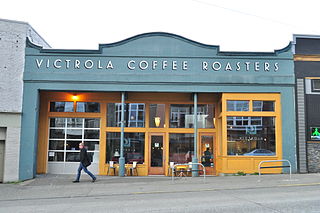
Victrola Coffee Roasters is a coffee roasting company with multiple locations in Seattle, Washington.
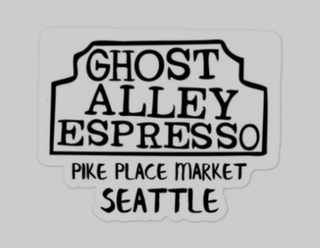
Ghost Alley Espresso is a coffee shop located at Pike Place Market in Seattle, Washington, United States. The business operates in a former service room for bathroom attendants on Post Alley, close to the Gum Wall. The current owner Michael Buchwald purchased the business from Mercedes Carrabba, who used the shop as a starting location for ghost tours. The space is supposedly haunted by the ghost of Arthur Goodwin, a former manager of Pike Place Market.

Cherry Street Coffee House is a chain of coffeehouses in Seattle, Washington, United States.

Boon Boona Coffee is a Black-owned coffee roaster and coffeehouse with two locations in the U.S. state of Washington.
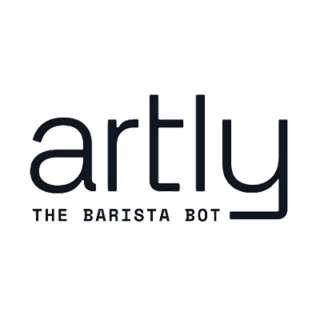
Artly Coffee is a chain of coffee shops featuring robot baristas, based in Seattle, Washington, United States. Meng Wang is a co-founder.





















